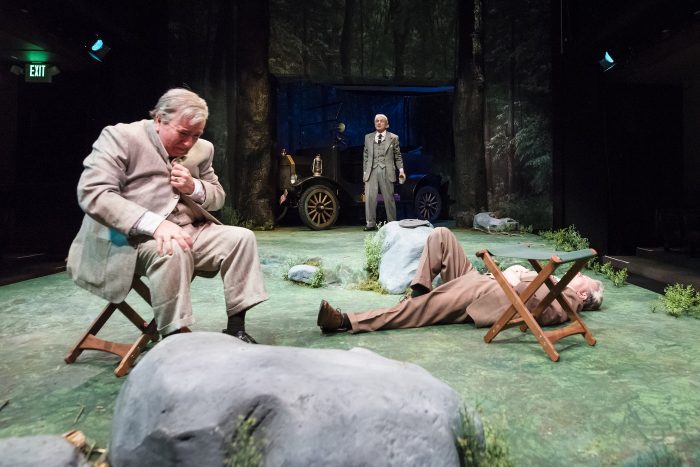So many famous names on local stages right now in Seattle Theaterland!
Henry Ford!
Amelia Earhart!
Thomas Edison!
Dame Agatha Christie!
President Warren G. Harding!
Aimee Semple McPherson! (again…)
Cher!!!!
OK…I lied about Cher.
Unfortunately.
Two local theater companies are oddly currently producing plays about famous real people from the same era (the 1920s/30s) and even more oddly, one is a play about 3 famous men (who did all meet each other) and the other is a musical about 3 famous women (who never met) and one is kinda ok and one is mostly awful but both have talented actors in them.

Rob Burgess as Thomas Edison, David Pichette as Henry Ford and Frank Lawler as Warren G. Harding in Camping with Henry and Tom at Taproot Theatre. Photo by Robert Wade.
Review: Camping with Henry and Tom by Mark St. Germain. Produced by Taproot Theatre Company. Directed by Scott Nolte. Scenic and Sound Design by Mark Lund. Costume Design by Melanie Burgess. Lighting Design by Timothy Wratten. With David Pichette, Rob Burgess, Frank Lawler, Kevin Pitman. Now through March 3, 2018.
Let’s start with…the ok-ish play with three famous men in it but you wouldn’t know by the misleading title of the play: CAMPING WITH HENRY & TOM, Taproot Theatre’s production of Mark St. Germain’s 1995 play that’s about a bizarre real-ish event: in 1921, Ford Motor Company founder Henry Ford, famed inventor Thomas Edison and the then current president of the United States, Warren G. Harding went camping in the Maryland woods and kinda maybe got lost for a couple hours. And, even though Ford and Edison get top billing within the title of the play, it’s really about Ford and Harding fighting for the White House with Edison as genial, misanthropic funny sidekick. Act I sets up the dynamic between the three men while Act 2 naturally wraps it all up and reveals some not so pleasant truths about these very famous people…but not necessarily all of them.
Basic premise: Henry Ford has deliberately lured Edison and Harding into the woods to spring a surprise on them. Ford (and his ego) desperately want to be President of the United States because Ford thinks he is the only one who can save America since he’s a brilliant businessman.
Sound familiar?
Ford wants to lure Edison, the most respected man in America, to support him and he wants Harding to step aside and not run for re-election in 1924 or else Ford will ruin him with proof of Harding’s infidelities and general lazy crookedness. Eventually, Harding reveals he is a weak man who never really wanted to be President and would be happy to become a private citizen again. Ford reveals….well, some of Ford’s darker and less pleasant traits (other than having a big mouth and a big ego) like his well documented anti-Semitism.
You would think Mark St. Germain created this play after the recent Rise of Trumpian Politics but the truth is, the playwright created Camping with Henry & Tom after the election of 1992 and the rise of another loud mouthed populist industrialist, Texas billionaire Ross Perot. Taproot chose to produce this rather dated piece following the success of Trump in the 2016 elections.
There are major differences between Ford and Trump. Henry Ford was an actual successful businessman who changed the world by making the car affordable to the masses and by streamlining the industrial process. Ford was also surprisingly good to his workers offering them excellent salaries and benefits (his theory was that by creating a prosperous working middle class, they would be able to afford things like cars and houses and thus create viable markets for the selling of goods). Ford was also supportive of fair hiring of African-American workers at a time when few industries would employ black workers for anything other than menial tasks like janitorial work.
Donald Trump is a slum lord who inherited wealth and created numerous businesses which failed but has rather spectacularly succeeded at self-promoting himself into celebrity and the White House, the one thing Ford failed to do.
Mr. St. Germain obviously did a lot of research on his three principal characters in Camping with Henry and Tom but while he succeeds in painting a warts and all picture of Henry Ford (Ford’s hatred of Jews is hinted at in Act One and becomes a plot point in Act Two) he either white washes the character flaws of Harding and ignores Edison’s tendencies towards pettiness and taking credit for other’s work. And, to be truthful, most “great” people are flawed to one degree or the other, and reaching greatness does have a tendency to result in climbing over lots of other people to reach the top.
But, pointing out Ford’s flaws while minimizing issues with the other two characters is cheating a bit even if it’s for the sake of developing a plot and structure for the play. It’s all a bit over simple: Ford is the “villain” with Harding as “patsy” and Edison as “comic relief”. This play does feel dated; it feels labored and overly structured with a contrived plot and overly cuter than thou dialogue. It’s not a great piece of dramatic literature. At best, it modestly amuses.
It does have talented experienced actors involved with David Pichette as the tartly verbose Ford, Frank Lawler as the boyishly but also crookedly endearing Harding and Rob Burgess, amusingly genial and wry as the avuncular Edison. (Kevin Pitman is also here as the Secret Service man who rescues them; he does a fine job with a nothing role.) All the actors are enjoyable and make the most of the bland material. Camping with Henry and Tom is mildly amusing/interesting but the liberties taken with historical accuracy are problematic for me. Harding WAS a philandering crook and not just a naive patsy; it’s ridiculous to suggest otherwise.
It’s the equivalent of blaming Melania and the “Russians” for the election of Donald J. Trump.

Not even the comedic charms of Seattle actor Rebecca M. Davis can save Seattle Public’s turgid musical VANISHING POINT. Photo by John Ulman.
Review: Vanishing Point. Book & Lyrics by Rob Hartmann & Liv Cummins. Music by Rob Hartmann. Original Concept & Additional Lyrics by Scott Keys. Directed by Annie Lareau. Music Direction by Jeff Caldwell. Scenic Design by Andrea Bush. Lighting Design by Kristi Matthews. Sound Engineer: Harry Todd Jamieson. Properties Design by Robin Macartney. Costume Design by Kelly McDonald. Projection Design by Ahren Buhmann. With Heather Hawkins, Cristin J. Hubbard and Rebecca M. Davis. Now through February 25, 2018 at the Bathhouse Theatre at Green Lake.
Meanwhile, and also in a north Seattle Theater, we have have a story about three famous females of the same era though most of their stories take place a bit later and instead of an unlikely play, we have an even unlikelier musical telling their tale.
Poorly.
The chief issue with Seattle Public Theater’s VANISHING POINT is the fact it’s a musical with horrible music and a terrible book. Act One of this work tries to present the back story of each of these three acclaimed women who all, at some point in their lives, vanished from sight. Two of them disappeared briefly; one, was never seen again.
Of course, that’s really the only thing they have in common. Oh…they’re women. And, they struggled with being strong women in a time when it was very difficult for any woman to be treated with respect in any field outside of being a wife and mother. But, even their “vanishings” all aren’t the same…evangelist Aimee Semple McPherson disappeared for a few weeks in 1926 and later claimed she was abducted and escaped, but the real explanation is she almost got caught shacking up with a married man who worked for her, and made up the ridiculous story to save her reputation and ministry. Mystery writer Agatha Christie had a nervous breakdown after discovering her husband was cheating on her with another woman and fled to a spa hotel and claimed she had amnesia for 10 days, also in 1926. And, famed aviatrix Amelia Earhart disappeared for good while trying to fly around the world in 1937, presumably crashing into the Pacific Ocean.
So, one was a fraud and a cover up; the other was a breakdown and the third was an accident. Act Two of Vanishing Point tries to make a vague and not at all sensible case for some sort of hoodoo-y/Dr. Whovian timey wimey parallel void dimension explanation which really doesn’t make the slightest bit of sense even in a fantasy such as this. (Even fantastical things should have some sort of logic to them even within the realms of fantastical logic; if the story telling is GOOD, then the logic, as crazy as it might be, works within the context of that unique world. Otherwise, it’s just lazy writing.)
Vanishing Point has a Book & Lyrics by Rob Hartmann and Liv Cummins with music by Mr. Hartmann and an “original concept & additional lyrics” credit to Scott Keys. The dramatic plot and structure of the book is all over the place. Since the plot constantly and inconsistently lurches back and forth between the three real characters and their actual lives albeit in different time lines, it’s a sloppy and incoherent mess. All three of their stories are awkwardly cut and you don’t really discover much about any of them other than they “have dreams” and “problems”.
And, the songs are trite and awful with banal lyrics and not particularly memorable melodies. Earhart, being a pilot, gets lots of “flying and soaring” songs about yearning and freedom while Aimee gets songs about…frustration? It’s hard to say since her character is the least successfully drawn here…she’s just loud and fussy. As a result, her songs are the worst of the three characters. At least the Agatha Christie character gets some vaguely cute songs about the thrill/drudgery of writing a mystery novel.
Also, we have to deal with the fact that this show sorta glosses over issues with Aimee Semple McPherson. Apparently, there are folks out there determined to make her some sort of feminist hero for being tough and strong and successful. True, she was all that. But, there is also the truth that she was your typical evangelist/con artist making millions off poor people by offering them “salvation” while she helped create what became the horrifying modern evangelist/right wing movement that mostly preaches hates and bigotry while earning pseudo churches billions of dollars and promoting right wing causes that influence political elections.
But, I digress.
I get why Kathie Lee Gifford loves Aimee enough to create a musical solely about her (the truly terrible “Saving Aimee/Scandalous” which had a run in Seattle prior to a floppo turn on Broadway a few years back). Kathie Lee saw Aimee as a put upon martyr who was preyed upon by the evil media/liberal journalists just like she herself was cruelly victimized and sought to elevate Aimee to greater appreciation. But, like most of Mrs. Gifford’s contributions to the world of entertainment, it’s a lot of hooey. And, why does the world need another lousy musical about this con artist? At least “Saving Aimee/Scandalous” took the time to create some sort of character for an actor to portray. Vanishing Point just gives the character bad clothes, mild religious fervor and an aching need to get laid at the beach.
The actors are wasted here though they have brief moments where they can delight us. Cristin J. Hubbard is an appropriately boyish and appealing Amelia, though she’s never given much to do other than sings “wanting songs” on a ladder. Poor Heather Hawkins is just given the previously mentioned bad outfits and puerile songs to make her mark. At least Rebecca M. Davis gets a chance to use her wicked comic timing to make her Dame Agatha a charmer.
Oh, one last thing to kvetch about….there’s only these three women in this show so they all play other roles within the other character’s story lines which is not only confusing at times, it also defies logic. Plus, when one actress is playing a male love interest to another of the main characters, it’s just weirdly “queer” which doesn’t do anything for the audience except make them ponder “were Amelia Earhart and Aimee Semple McPherson and Agatha Christie secretly lesbians”? It’s awkward and dumb…why not have ONE male actor play all those roles?
Better yet…just don’t do this turkey of a show and find something worth producing on a stage. Seattle Public usually does a fine job of choosing plays but Vanishing Point is proof that even good theaters can make huge mistakes.
Unless you’re a fan, friend or relative of anyone involved, this is not recommended.

















